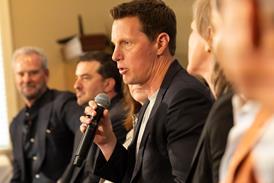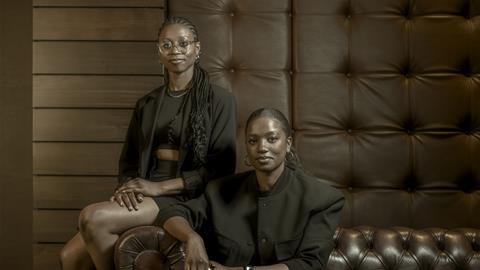Survival sits at the heart of the stories on Carbon Pictures’ fledgling film and TV development slate, which includes a feature adaptation of Yasmin Afifi’s Jellyfish & Lobster (in treatment stage with BBC Film and Agile Films, and based on the Bafta-winning short of the same name), plus a 1980s-set whodunnit that leans into the experience of the Nigerian diaspora.
For the company’s founders, south London-born sisters Elizabeth Rufai and Abiola Rufai-Awojide, forging a production partnership was not the end goal. “We are polar opposites,” says Rufai-Awojide.
Rufai’s way into film came through meeting Lionsgate UK’s then-head of publicity Lorna Mann at an exercise club and clinching work experience that evolved into a marketing assistant job. She sidestepped into producing, working with production banner Somesuch before being awarded a BBC scholarship for the National Film and Television School’s producing MA, graduating in 2023 and landing the Bafta with Afifi for their graduate short. Rufai is currently back at Somesuch as an associate producer on 2017 Star of Tomorrow Harris Dickinson’s untitled feature directing debut.
Rufai-Awojide is five years older than Rufai and had a headstart in the industry. She cut her teeth on “a million and two” shorts and as an assistant in “pretty much every department” at Channel 4. Her short credits include producing Abraham Adeyemi’s No More Wings, which won best narrative short at Tribeca in 2020.
Rufai-Awojide later held posts at BFI Network and Sid Gentle Films, working on TV series Ragdoll and Extraordinary. Through Film4’s associate producer programme, she boarded Molly Manning Walker’s Bafta-nominated feature How To Have Sex. The sisters also bring differing formative life experiences to producing — Rufai lived in Lagos as a teenager, while Rufai-Awojide remained in London.
Having helped each other out on the odd job, they decided to team up formally just before Covid hit. “We realised our separate paths were really valuable,” recalls Rufai. “We started sharing our experiences of what we wanted to see, and our frustrations about what we weren’t seeing. We felt we would be much stronger together.”

























No comments yet